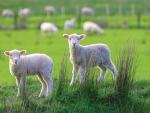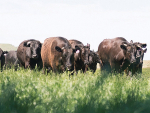Drench resistance is already hitting farm profits; it's not just a future problem.
At a recent Beef + Lamb NZ field day, Wairarapa farmers showed it doesn't have to be the end of the road. With the right support, knowledge and confidence, farmers can stay ahead of resistance and keep stock performing.
The event featured members of the Wairarapa Livestock Parasite Management Group, a collaboration between B+LNZ and local vet and parasite expert Sara Sutherland. Farmers in the group shared their experiences managing drench resistance and offered practical advice for others facing similar challenges.
The panel outlined a range of strategies to tackle resistance, starting with monitoring, then moving through prevention, stock integration and ensuring drench is not the first solution reached for.
"You're farming worms," one farmer said. "Once you figure out your worms, then you farm accordingly." Many farmers don't realise resistance is an issue until it's already causing problems. That's why monitoring is essential. The group encouraged others to begin with faecal egg counts and drench effectiveness tests, and where possible, identify worm larvae species. As Sara Sutherland put it, "Test, not guess."
Monitoring livestock condition was another key focus. Speakers highlighted the importance of ewe condition, noting that well-fed ewes often don't need routine drenching. Healthy ewes also produce heavier lambs at weaning, allowing lambs to be sold or moved off the farm earlier. This reduces worm pressure and improves overall farm health.
Wormwise programme manager Ginny Dodunski reminded farmers there is no universal solution. "There is no recipe for perfect parasite management on every farm," she said. "Starting with the basics - good feed, parasite monitoring and minimising the time lambs are on grass - can make a big difference."
Read More:
Other strategies discussed included reducing the number of young animals on farm, identifying blocks with high and low contamination, using mature animals or cattle to clean up pastures and maintaining refugia (a way of preserving drench susceptible parasites). Attendees also learnt about DAGI (Drench and Grazing Integration), a new app being developed with B+LNZ support to help farmers map contamination levels across paddocks.
Genetics was briefly mentioned but recognised as an important long-term part of the solution.
By following these approaches, farmers can reduce their reliance on drench. Reflecting on past practices, one panellist said, "These days we don't put a drench into any ewe, we don't put a capsule into our hoggets... We’re living in a new world now where that’s just not an option if we want to carry on and hand the farm over to the next generation as a viable business.”
The takeaway from the field day was clear. Prevention is ideal, but practical management can make a real difference.
Looking ahead, B+LNZ’s parasite research programme is focused on developing new diagnostic tools and supporting changes to farm systems. Awanui Veterinary is currently working on a new tool that will provide more detailed information about parasite species faster for decision making. Following the success of the Wairarapa group, seven parasite management groups have now been set up across the country, if you want to find out more talk to your local extension manager.











